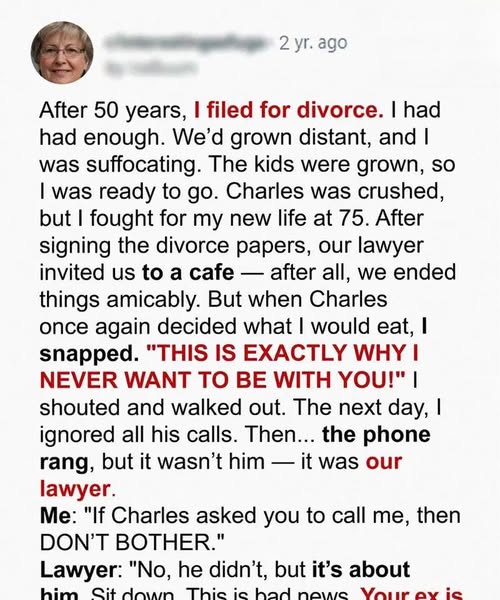Hospitals always smell the same — bleach, fear, and something metallic. I found him in a bed that looked too big for him, machines pulsing beside him like artificial lungs. His daughter, Priya, stood by his side, eyes red and exhausted. “I didn’t know who else to call,” she whispered.
I sat down and took his hand. For days, I came back — not because of guilt, but because something in me had shifted. The anger that had fueled me for years had burned itself out, leaving only ashes and a strange tenderness. I brought him books, rubbed lotion into his dry hands, read him headlines, filled the silence with the rhythm of a life we’d once shared.
And I told him the truth.
“I left because I couldn’t breathe,” I said one night. “You didn’t hear me when I spoke, and eventually, I stopped trying. That’s not all on you — it’s on both of us.”
Six days later, as I read aloud from the classifieds — “Roommate wanted, must enjoy jazz and bad cooking” — he made a sound. A low groan. His eyelids flickered. Then he whispered, “Mina?”
“It’s me.”
“I thought you were done with me.”
“I was,” I said, “but that doesn’t mean I stopped caring.”
He smiled — crooked, weak, familiar. “Figures you’d come back when I’m helpless.”
I laughed through tears. “You always did like the drama.”
Recovery was brutal, but he fought for every inch of progress. Through therapy and exhaustion, we rebuilt something small but real. We didn’t dissect the past — no endless blame, no what-ifs. Just quiet talks about ordinary things. He told me he never realized how much I did until I was gone. I admitted I hadn’t realized how much I’d given up until I left. We weren’t seeking redemption. We were just learning how to speak again.
A few days before he was discharged, Priya pulled me aside. “He changed everything,” she said. “The will, the accounts — most of it’s still in your name.”
“That doesn’t make sense.”
She nodded. “I told him that. He just said, ‘No matter how angry she is, she’s still my Mina.’”
When I asked him about it, he shrugged, eyes on the window. “It’s not much. Just something to show I cared — even if it’s late.”
“It’s not about money,” I said.
“I know. I figured you’d refuse anyway. You’re predictable.”
We both laughed. And I did refuse. But out of that conversation came something unexpected — an idea. Together, we decided to use the money to build something for others. Something that might mean as much to someone else as it did to us in that moment.
We created The Second Bloom Fund — a scholarship for women over sixty who wanted to return to school, to start again, to rediscover themselves after long marriages or loss. Watching him light up over the details — the logo, the letters, the first applicants — was like watching him come back to life.
We never remarried. That door had closed, and we both knew it. But we opened another one — a friendship built from the wreckage of what once was. Every Thursday, we met for lunch. I ordered for myself. We argued, teased, and laughed, but it never hurt anymore. The kids didn’t understand at first. Eventually, they stopped asking when we’d get back together. They just saw two people being kind again, and that was enough.
The biggest surprise wasn’t falling back into his orbit — it was falling in love with myself again.
I bought a small condo, got a part-time job at the community library, and spent my weekends tearing up my garden just to plant it differently again. I fixed my own leaky sink, learned to live alone without feeling lonely. At seventy-six, I felt more alive than I had in decades.
Three years later, Charles was gone. Peacefully. I was there, holding his hand. After the funeral, Priya handed me an envelope. Inside was a note in his familiar, looping script.
“If you’re reading this, I’m gone.
Thank you for coming back — not to stay, but to sit beside me a little longer.
You taught me to listen, even when it was too late to change.
And you taught me to let go with grace.
I hope the rest of your life is exactly what you want.
Still a little bossy, but always yours,
Charles.”
I read it three times before I cried. Not for what we’d lost — that had already happened years before — but for the strange beauty of how it ended. Not in anger, not in regret, but in peace.
Every year on his birthday, I visit the garden behind the community center we built with the scholarship funds. There’s a wooden bench with his name engraved on it — Charles Bennett, Patron of Second Blooms. I sit there with a coffee and tell him the news he’d care about: which scholar just finished her nursing degree, which tomato variety finally survived the heat, who got married, who didn’t.
The air smells of soil and sunlight. The bench warms beneath me. I don’t feel sad.
Closure, I’ve learned, isn’t about slamming a door. It’s about finding stillness after the storm. It’s the quiet of a hospital room where love finds a second language. It’s signing a check for another woman starting over at sixty. It’s knowing that sometimes, endings don’t need to be bitter to be final — and that forgiveness, when it finally comes, is just another word for freedom.

